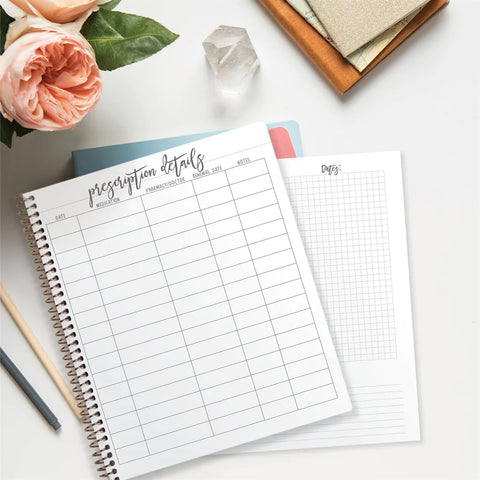Managing Medical Issues: Tips for Organizing and Tracking Medications and Appointments
Posted by Practical Paper Co. on

Managing medical issues can be overwhelming, with numerous medications, doctor appointments, and important health-related information to keep track of. However, with the right tools and organization strategies, you can stay on top of your health and make the process more manageable. In this blog post, we'll provide you with valuable tips on using planners and stationery to effectively organize and track your medications, appointments, and health-related information.
Create a dedicated health section, or invest in a planner just for tracking medical issues and medications. Follow these steps to reduce stress and keep track!- Choose the right planner: Select a planner with ample space and customizable sections to suit your needs. Look for layouts that allow you to easily track medications, appointments, symptoms, and other relevant information.
- Utilize a medication tracker: Designate a specific section in your planner to track your medications, or purchase a medication tracker just for this purpose. Create a table or checklist to record the medication name, dosage, frequency, and any special instructions. Use color-coding or symbols to easily identify different medications.
- Establish a medication log: This can help you monitor the effectiveness of your medications and identify any issues. You'll also be able to check back to ensure your doses have been taken as scheduled.
- Appointment tracker: While you can create a separate section to track your medical appointments, it may be more helpful to track these alongside your other daily appointments and tasks. That way you can be more mindful when a particular day may be getting too full and shift tasks to a more realistic time. Include the date, time, healthcare provider's name, and purpose of the appointment. Add reminders for any necessary preparations or questions to discuss with your doctor.
- Track Your Symptoms: Use symptom tracker pages and chart pages to record any symptoms you experience, their severity, and their frequency. This information can be valuable during doctor appointments, enabling you to provide accurate and detailed information about your health.
- Medical contacts: Create a section in your planner to store important medical contacts, including doctors, specialists, pharmacies, and insurance providers. Include their names, phone numbers, and any additional notes or instructions.
- Review and update regularly: Set aside time each week to review your planner, update medication lists, and check upcoming appointments. This practice ensures you stay proactive and can address any changes or concerns promptly.
- Communicate with healthcare providers: Share your organized planner with your healthcare providers during appointments. This provides them with a comprehensive view of your medications, symptoms, and appointments, enabling them to provide better care.
Managing medical issues doesn't have to be overwhelming when you have the right tools and strategies in place. By utilizing a planner to organize and track your medications, appointments, and health-related information, you can stay on top of your health journey with ease. Practical Paper Company offers a range of functional and stylish planners and stationery items to assist you in managing your medical issues effectively.
